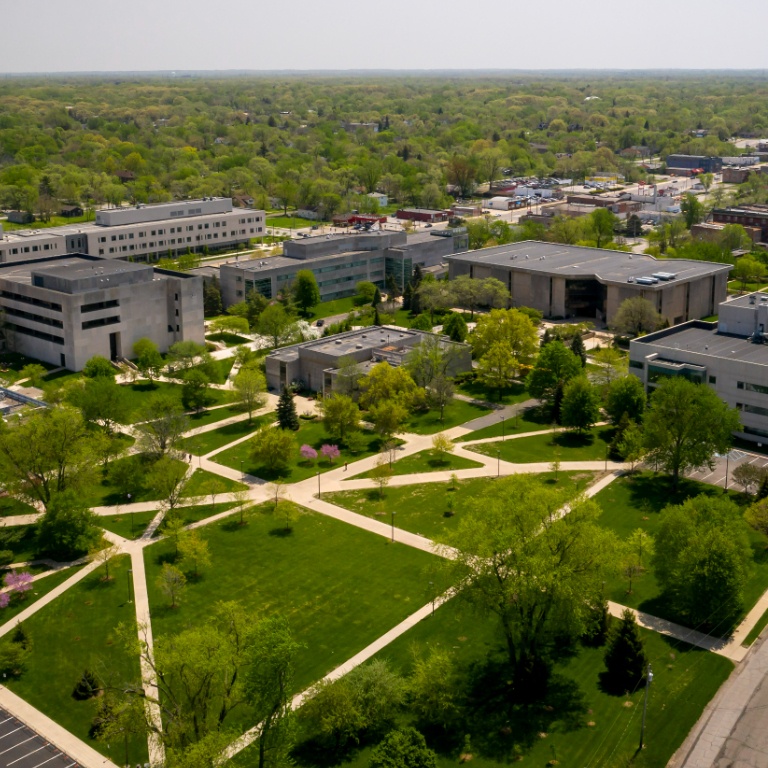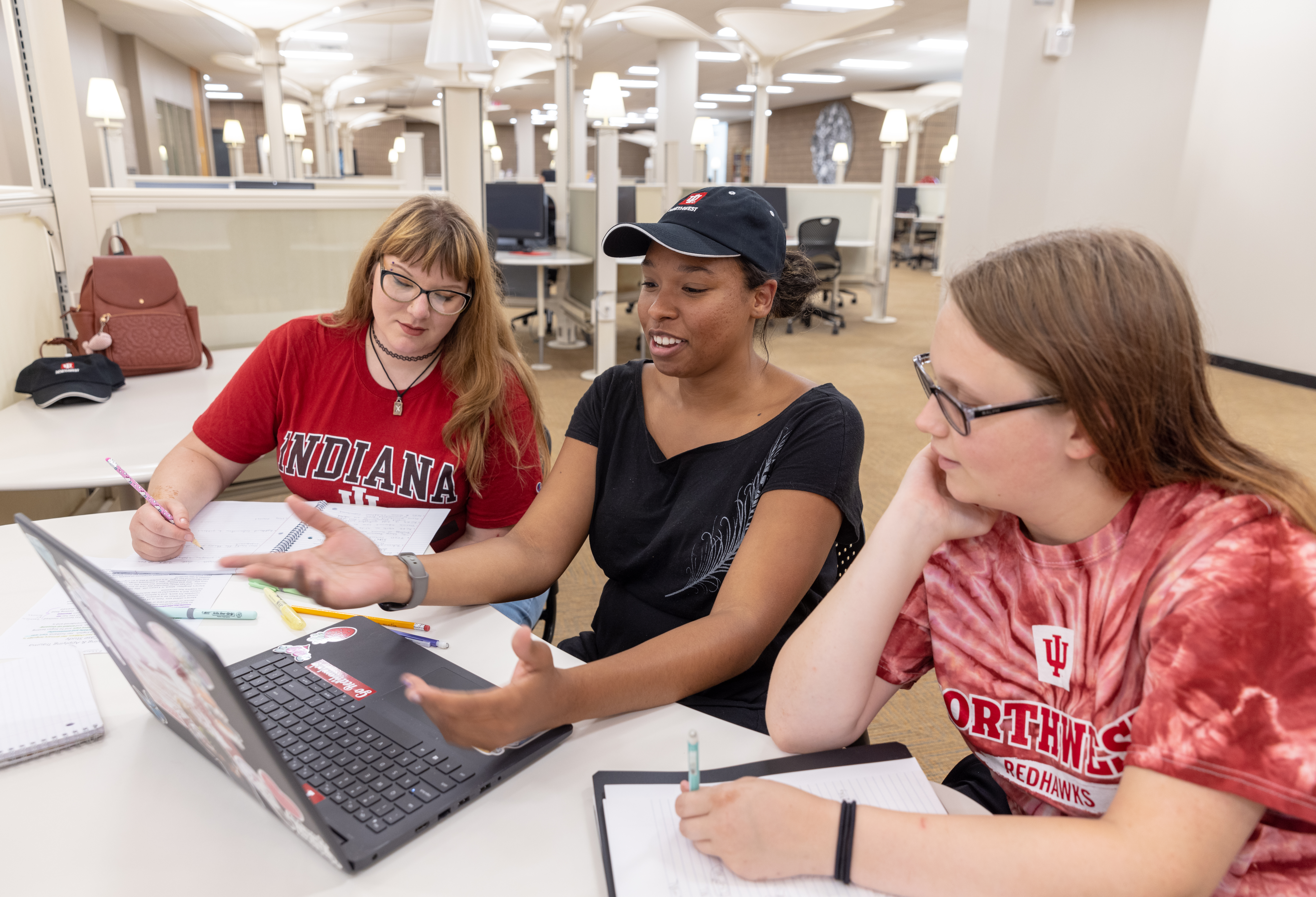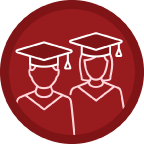Data shows exceptional outcomes as a result of faculty development
GARY, Ind. — Indiana University Northwest offers affordable undergraduate, graduate and certificate degree programs, but keeping students engaged and successful throughout their academic journeys has been a continued focus for educators at the Northwest campus.
As a designated Hispanic Serving Institution (HSI), IU Northwest received funding to do just that through the INVEST and TRIUNFOS initiatives, which, among other objectives, include participation in professional development for its faculty and staff and curriculum redesign for faculty development, respectively.
Since the fall 2022 semester, 47 faculty members have participated in effective teaching practices through faculty development courses by the Association for College and University Educators (ACUE). Over the past year, two cohorts (one starting in the fall, another in the spring) have spent time learning, sharing ideas and implementing new teaching practices in their classes.
The practices — as shown by recent data — have produced exceptional outcomes.
Professors enrolled in the effective teaching practices cohort have seen drastically lower DFW rates (students who finish a course with a D, F or withdrew), higher grades overall and reduced achievement gaps for all students.
When comparing the spring 2023 semester – in which professors implemented new teaching strategies – to the previous three years, here’s what the data shows:
- Lower DFW rates: The percentage of DFW rates in these courses dropped 8 percentage points.
- Higher grades: The average GPA in these courses increased by .27 points.
- Reduced achievement gap: The DFW rates dropped significantly for African American (19%), Latine (12%) and White (9%) students.
“We tried things out and thought about things and it led to really impressive improvements in student outcomes,” Dean of the College of Arts and Sciences Mark Hoyert said.
Faculty success leads to student success
The goal behind experimental learning initiatives, which Hoyert and associate dean Kris Huysken have been instrumental in introducing, was to improve student success.
“It’s about making us more prepared to serve the students who come to our institution,” Huysken said. “There’s a recognition that the student-faculty relationship is really important in student success.”
The participating cohorts take part in ACUE’s intensive 25-week, full academic calendar year course which is focused on active learning, higher-order thinking and a deeper level of learning. For years, the College of Arts and Sciences has participated in professional development to retain and graduate more students.
From 2016-2019, IU Northwest joined a coalition of American Association of State College and Universities (AASCU) in the “Re-Imagining the First Year” initiative. This project aimed to ensure success for all students — particularly low-income, first-generation and students of color — who have been historically underserved by higher education.
While there were several initiatives through this process, the one that proved most effective was the Pedagogical Innovation Groups (PIGs), where faculty members discussed and implemented different pedagogies in their curriculum.
For students who entered college in 2019, the retention rate at IU Northwest was over 70 percent, an all-time high for the institution, after the PIGs were implemented. However, higher education institutions across the country saw enrollment and retention rates suffer as a result of COVID-19. With these grants, Hoyert hopes to bring IU Northwest’s retention rate back up to pre-COVID levels.
“We’ve explored pedagogies that worked and we’re now able to keep a lot more students around,” Hoyert said. “The grants were a logical extension of this.”
Once IU Northwest received HSI designation, Hoyert and Huysken were among those who developed a grant focused on professional development for faculty and staff. This includes improving the retention and graduation rates of lower-income, minority and first-generation college students.
While experimental learning has already proven successful, there’s more work to be done.
Long-term goals
Hoyert has been teaching for more than three decades. When he implemented what he learned in the ACUE courses, he was astonished at the results.
Even the small details, things he thought would go over the students’ heads, made a huge difference. Several techniques Hoyert implemented provided students with more autonomy over their learning. Rather than seeing these techniques as another assignment or project, Hoyert said the students appreciated the opportunity to dive deeper into topics that particularly interested them. As a result, last spring’s course evaluations were the best he’s received in his career.
Huysken said other faculty members have had an “overwhelmingly positive response.”
“Especially when faculty see the outcomes,” Huysken said. “They see the data and they see it’s working. They’re not just out there alone trying these things and having no idea what’s going on. They can see results and that’s important.”
From the student and faculty response to the preliminary data, faculty development is working. Still, Hoyert and Huysken believe there is still room for improvement.
After cohorts go through the experimental learning courses and implement some of the strategies, the goal is to redesign some of the already existing classes on campus to see even better results.
“Our efforts are at the level of the individual class,” Hoyert said. “What can we do to make the classes more appealing? More effective? One of the things we always think about is what we can do to build a class that’s more engaging so students will attend.
“And, so, it improves student success at the level of the class which, then, should have cascading effects.”
The hope is to implement some of these pedagogical groups in the onboarding process, so faculty — full-, part-time and adjuncts — and staff can see results as soon as they begin their positions at the university.
Whatever the future holds for these active learning groups, the goal will remain the same – to improve grades, retention rates and graduation levels for all students.


